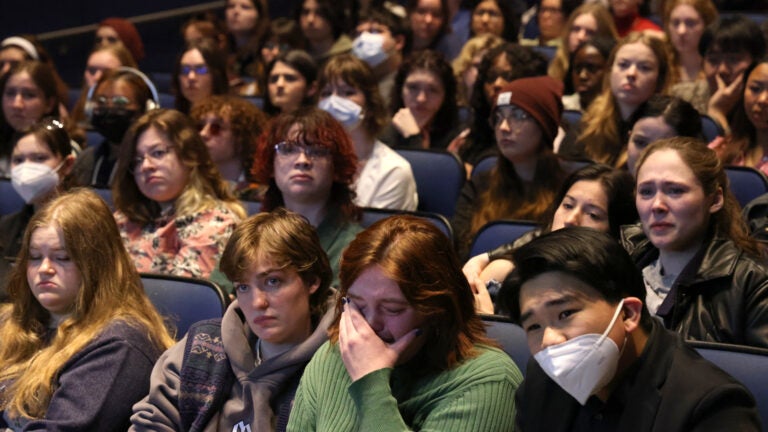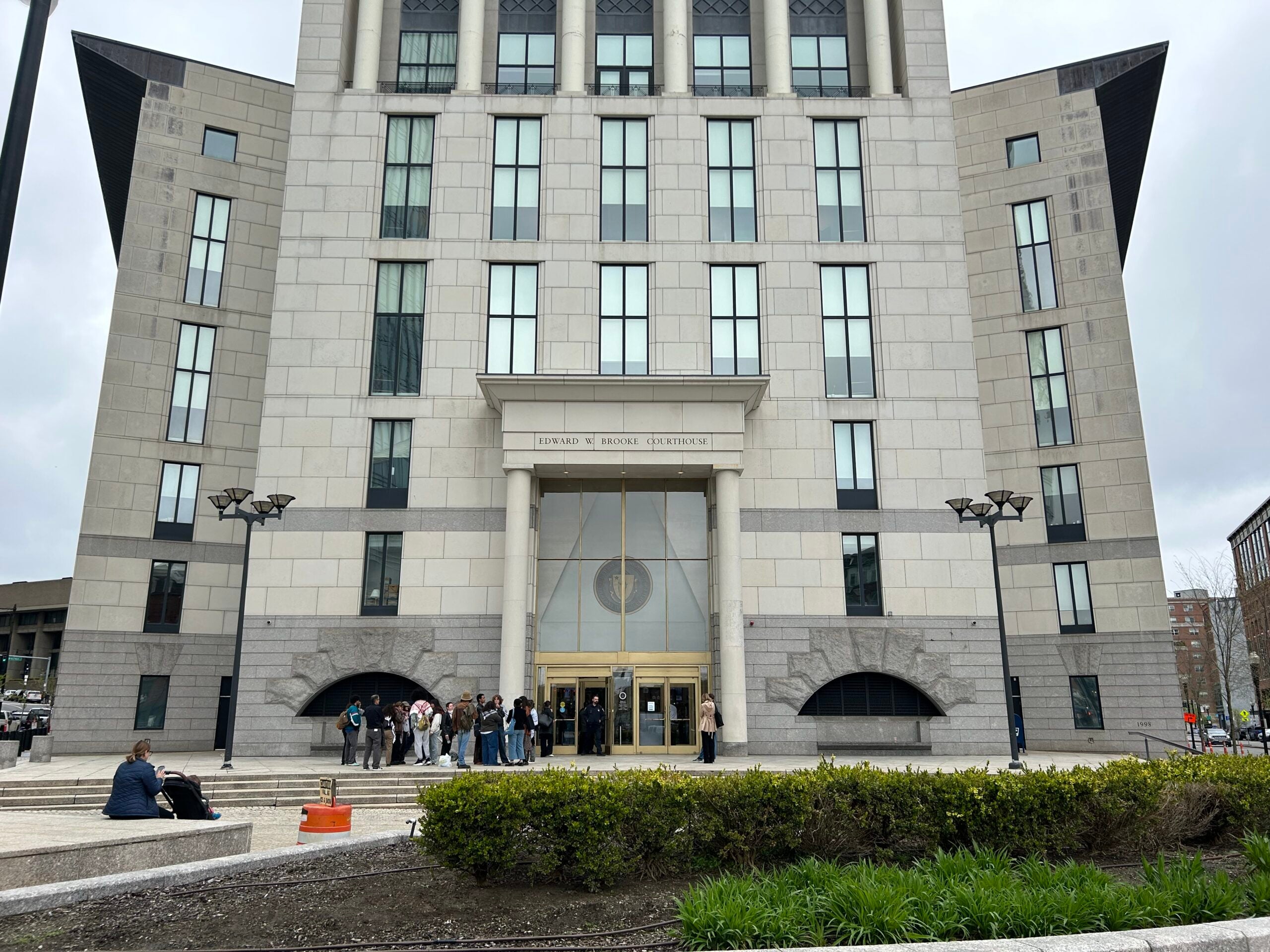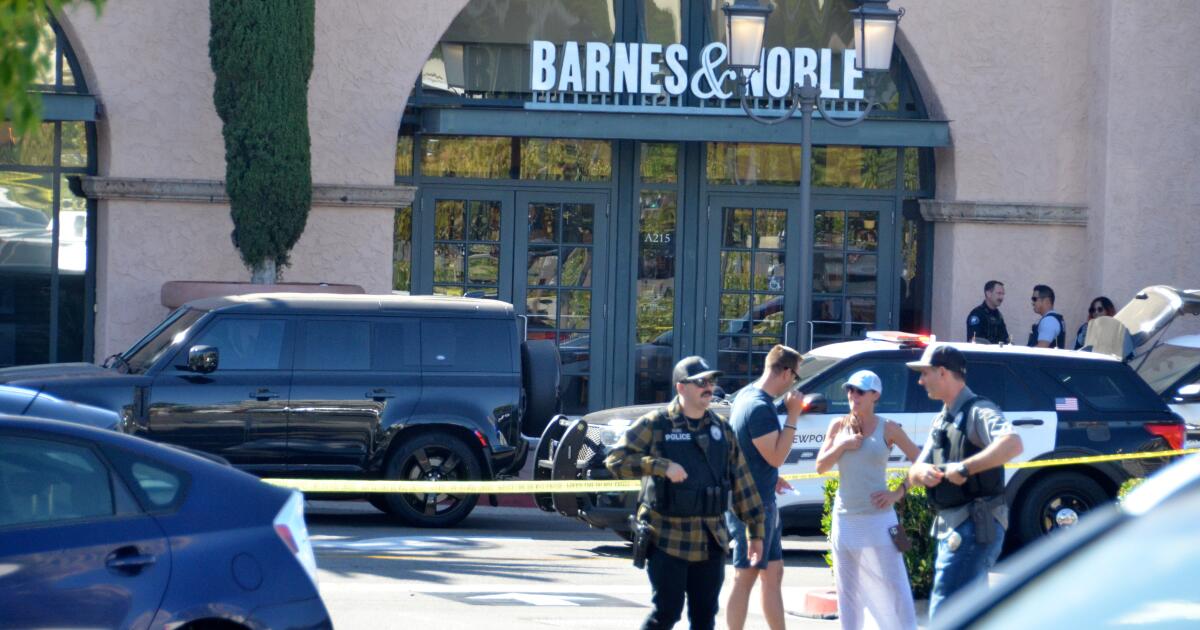As indictments continue, emotions remain high for Emerson protesters

Local News
Some Emerson College students have accused police of using excessive force while clearing an encampment set up by pro-Palestinian protesters.

Emerson College students at a student government meeting to call on the school’s president, Jay Bernhardt, to resign after police dismantled a pro-Palestinian encampment on a public road near campus. Jack Kaplan/The Boston Globe
As the doors to a courtroom on the fifth floor of the Edward W. Brooke Courthouse in Boston opened, a crowd of Emerson College student activists and their allies gathered.
A group of pro-Palestinian students who were arrested last week for refusing to leave an encampment were about to leave the courtroom, where they were arraigned Wednesday morning.
“Shall we applaud? » a member of the crowd could be heard asking.
“Not sure. Maybe we’ll just break,” someone next to them replied.
Shy applause greeted the students as they exited. It quickly swelled, erupting into a cacophony of shouts and whistles of support. Dozens of people gathered outside the courtroom, many wearing kaffiyehs. Some exchanged hugs with close friends. Others introduced themselves to their peers for the first time. Lawyers, parents and Emerson staff spoke with the students. People handed out fruit snacks and bottled water.
The hubbub subsided and the next group of accused students prepared to enter the courtroom. About 20 minutes later, they received their own round of applause.
A total of 118 student protesters were arrested by Boston police when officers swept away in Boylston Place Alley early on the morning of April 25, according to the college. They will be arraigned for several days this week in Boston Municipal Court on charges including trespassing and disturbing the peace.
“Battered and bloodied”
Students who witnessed the arrests accused the police of using excessive violence.
“People were completely beaten and bloodied,” said Amrita Bala, a sophomore who helped organize the camp as a member of Emerson Students for Justice in Palestine.
Bala said she suffered a mild concussion and several students were injured. Sadia AboHussien, a senior and another SJP organizer, described seeing police “ping-pong” her classmates before pinning them to the ground. Some had their faces dragged across the concrete, others had cuts from the ties used to restrain them.
Student journalists with The Berkeley Beacon said he saw blood on the ground.
“This is the kind of thing you read about in history textbooks,” AboHussien said.
Rayan Afif, a freshman who was at the forefront of the group of protesters during the clashes with police, directly accused BPD officers of giving him a concussion. She described spending eight hours in a jail cell after being arrested, lost and unconscious. She has been in a “fog” state in recent days, repeatedly going to the emergency room for help dealing with shaking and fainting, she said.
Immediately after the incident, BPD officials said four police officers were injured themselves and no protesters reported injuries in their custody. However, the commander on scene asked a dispatcher to tell him which hospitals the two protesters had been taken to while officers were still clearing the alley, according to recordings obtained by The Boston Globe.
BPD spokespeople did not respond to a request for comment Wednesday afternoon.
Boston Mayor Michelle Wu said she made the decision to clear the encampment in tandem with Police Commissioner Michael Cox. She cited “public safety and fire risks” in a statement to the World.
“I am very, very angry with the university and the way the Boston Police Department handled this matter. These are children, non-violent children who are just expressing their opinion. The physical violence meted out against them was absolutely unjustified,” said Mohan, a parent of one of the arrested students. He asked to be identified only by his first name.
Emerson students are part of a growing movement calling for a ceasefire in Gaza, an expansion of Palestinian rights and for their universities to cut ties with the Israeli military and Israeli businesses. Since Hamas attacked Israel on October 7 and killed around 1,200 people, Israel’s subsequent military actions in Gaza have killed more than 34,000 people, according to local authorities. Israel has been accused of orchestrating genocide in the enclave and some experts say famine has already set in there.
Student activists are working to maintain the broader narrative about the plight of the Palestinians, while highlighting the crackdown on the encampments in the United States.
“The only reason for these camps is “Free Palestine”. We need to make sure everyone’s eyes are on this. We know exactly why we were there, why we stayed, and how we set up this space. I really don’t want people to forget that’s what we were there for,” Bala said.

“Common ground”
Nationally, the wave of pro-Palestinian protests has been met with allegations of anti-Semitism. Emerson student protesters say they are working to make clear that criticism of the Israeli government is not inherently anti-Semitic and that defending Palestinian rights is in the best interest of anyone who wants lasting peace in the Middle East.
“Palestinian liberation includes Jewish liberation. A free Palestine means that the Jewish people and Palestinians are safe,” Afif said.
This spirit was present inside the encampment for the four days it existed, according to several students who participated. Among the pro-Palestinian protesters are many Jews who accuse Israeli leaders of ignoring the religion’s fundamental teachings. The Emerson encampment was open to anyone wishing to interact peacefully with protesters, and no one was prevented from passing through the area, SPJ members said.
“We did everything that was instinctive, which was to collaborate, to be together, to share, to invite each other,” AboHussien said.
Jews kept vigil around Muslims as they prayed, AboHussien said. People from various religious backgrounds participated in a Passover seder. Some who had no affiliation with Emerson came to engage in conversations on topics such as gender, homosexuality, anti-Semitism and Islamophobia.
“There was so much sorrow, and there was so much joy, and there was sorrow in joy and joy in sorrow. It was incredibly beautiful. It’s so heartbreaking to see how this was taken away from us,” Afif said of the camp.
AboHussien expressed hope that a shared aversion to violence and dehumanization in all its forms could lead to some form of peace.
“We share this common frustration in the face of reality, in the face of this violence, in the face of these attacks on people’s identities. There is common ground there,” she said.
On Monday, Emerson administrators hosted a moderate town hall meeting in which much of the discussion centered on the arrests. More than 100 people spoke, according to the Tag. This is a much-needed step in the right direction, Bala said, but many more such discussions are needed.
Emerson will not bring disciplinary charges against the protesters, according to Bernhardt, and this will “encourage the prosecutor not to pursue charges related to encampment violations.” Students at the courthouse Wednesday said they expected to be ordered to perform community service. Members of the Massachusetts Chapter of the National Lawyers Guild are representative student protesters from Emerson and Northeastern University.
Following these arrests, Emerson’s student government unanimously passed a resolution calling for Bernhardt’s resignation. The college’s board of trustees has since supported Bernhardt and said it has no plans to remove him.
Thirteen people were arrested during Bernhardt’s inauguration in March. This protest was also organized by the SJP to draw attention to Emerson’s tuition hikes and the “silence on the ongoing genocide in Gaza.”
Outside the courtroom Wednesday, Bala spoke about returning to the site of the encampment for the first time since police cleared it. The entrance to the theater where the town hall was held is in the same alley.
She was struck by her sterility.
“They washed away all the blood, all the chalk, all the art.”

Newsletter Sign-Up
Stay up to date with all the latest news from Boston.com
Boston





